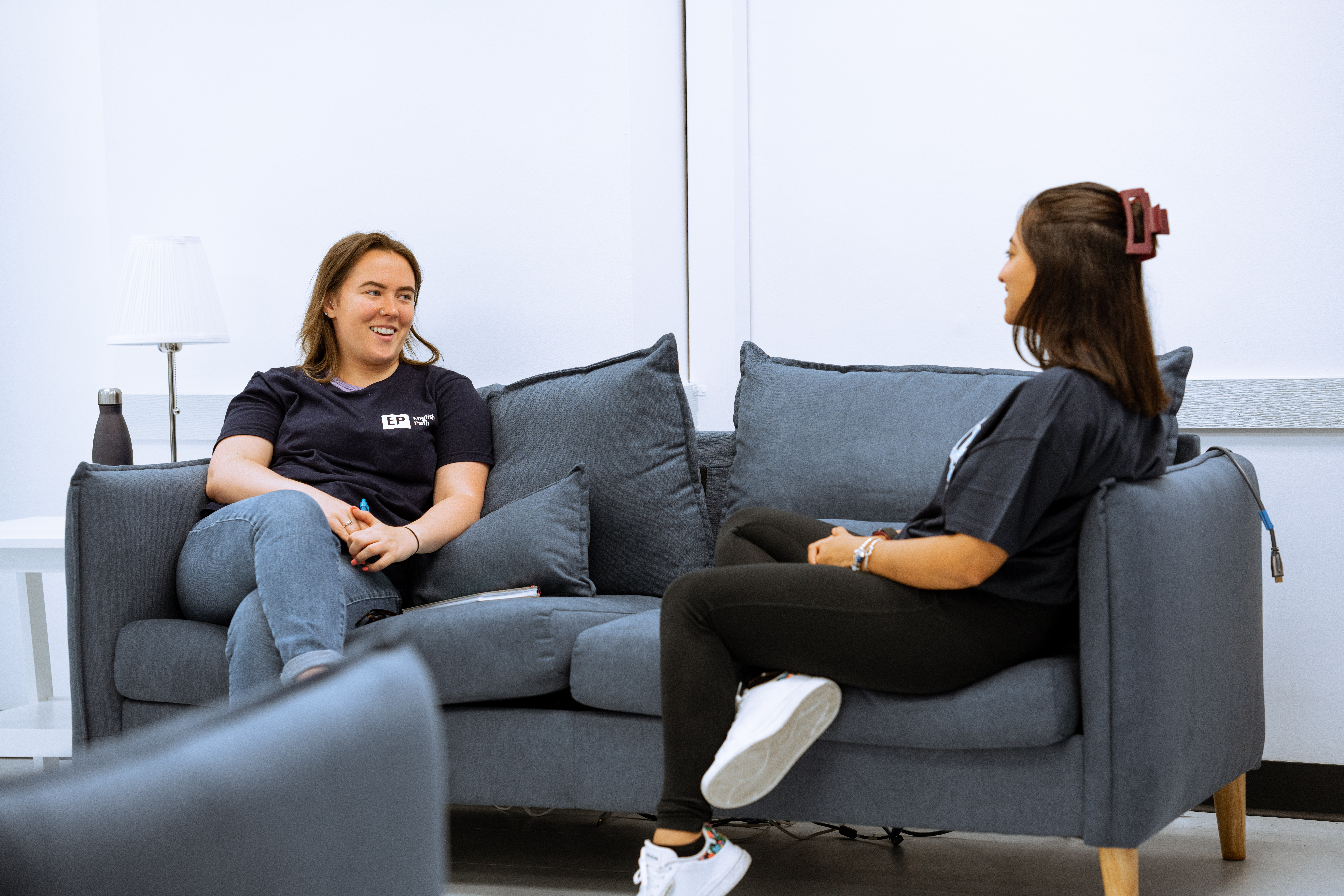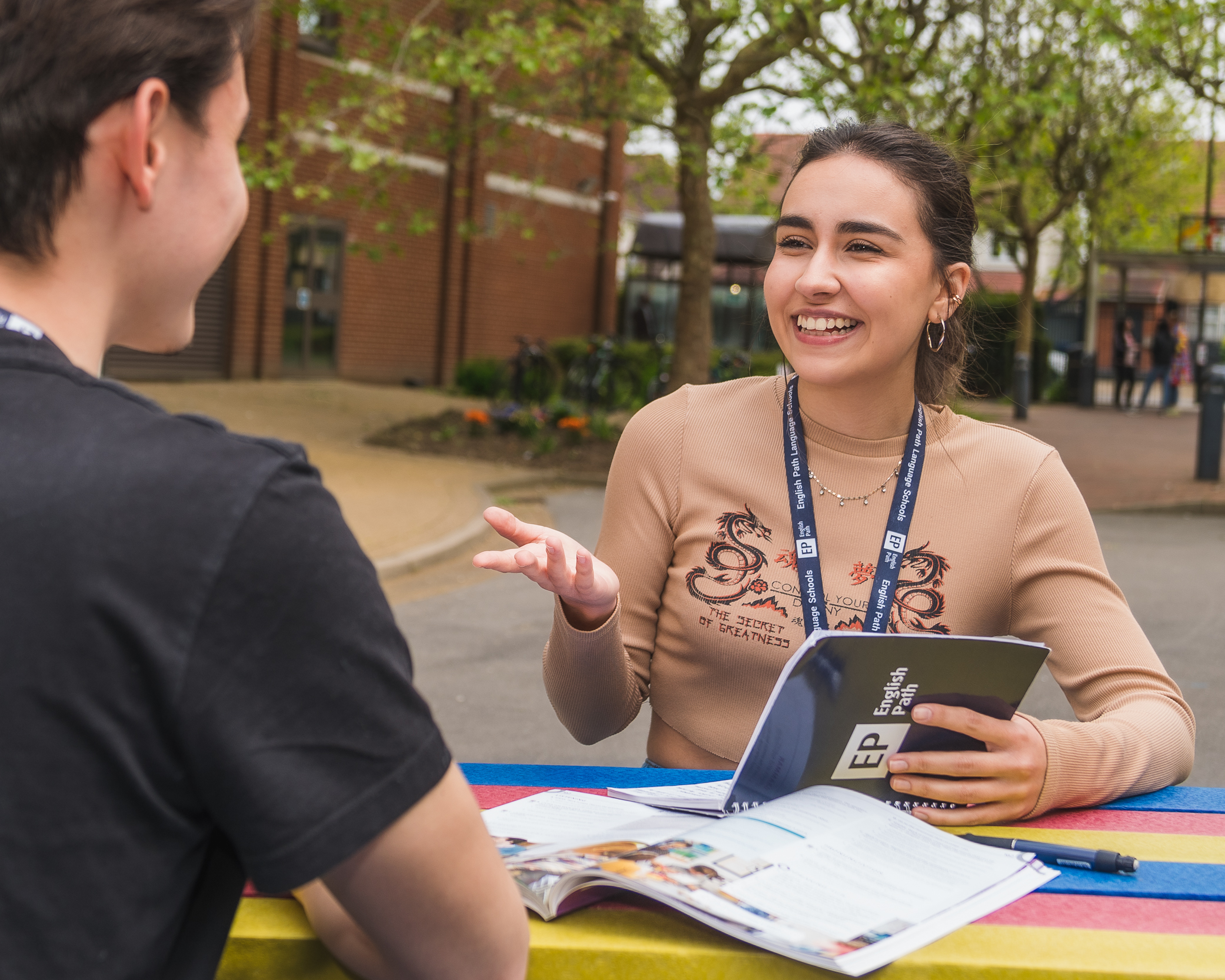The basic English communication skills include listening, speaking, reading and writing. These skills help you understand others, express your ideas clearly and communicate effectively in everyday situations.
Speaking is the fastest way to improve your English. Research shows that learners who actively engage in conversations improve their fluency up to three times faster than those who just study grammar books. Yet here is the challenge: 85% of learners say their biggest obstacle is fear of starting conversations.
Sound familiar? You are not alone. At English Path, we hear this from our students every day and we have seen countless learners transform from nervous beginners to confident speakers over the years. The secret? Having a few reliable conversation starters in your back pocket. In this guide, we will share 10 easy ways to break the ice and start chatting naturally in English!
The classic: Start with a weather discussion
Yes, it is a stereotype that British people love chatting about the weather, but there is a reason this one's stood the test of time! Weather is a universal, safe topic that literally everyone can relate to.
How to use it:
- Lovely day, isn't it?
- Can you believe this rain?
- It's absolutely freezing today!
- Finally, some sunshine!
Pro tip: Add a follow-up question like ‘Did you get caught in that downpour yesterday?’ to keep the conversation flowing.
Give a genuine compliment
Studies show that genuine compliments trigger the same brain response as receiving money; people love them. You can start with a simple hello and gradually proceed to offering compliments; just make sure yours is sincere!
Tips for using it:
- I love your trainers! Where did you get them?
- Your presentation was brilliant! How long did it take to prepare?
- That's such a cool bag. Is it new?
Pro tip: Always follow up with a question. This transforms a compliment into a conversation starter rather than just a nice comment.

Ask for help or advice
Here’s a fun fact: when you ask someone for help, they tend to like you even more; it’s called the Benjamin Franklin effect. People genuinely enjoy feeling helpful and appreciated.
Simple phrases to try:
- Sorry to bother you, but do you know where the library is?
- I'm new here; any recommendations for lunch spots?
- Could you help me with this? I am a bit confused.
- Which one would you choose?
Pro tip: The key is to sound observational rather than complaint. Keep it light and friendly.
Comment on your surroundings
You are both in the same place at the same time; that's instant common ground! This works brilliantly in queues, waiting rooms or at events.
Real-life examples
- This queue is long, isn't it?
- Have you tried their coffee here before?
- Is this your first time at this event?
- This place is packed today!
Pro tip: Start with the basics and slowly you can keep the conversation going.
Use pop culture references
Did you know that over 70% of young people use social media daily? Chances are, you share some common cultural touchstones with the person you are talking to. You can also reference some trending meme or crack a joke.
Conversation starters
- Did you see that viral video about...?
- Have you watched [popular series] yet?
- What do you think of the new[artist] album?
- Are you into [trending game/app]?
Pro tip: Make sure your reference is not too niche, or you might get blank stares instead of enthusiasm.
Start with open-ended questions
Here's the difference: Did you have a good weekend? (closed) vs What did you get up to this weekend? (open). Open-ended questions cannot be answered with just ‘yes’ or ‘no’. They invite stories and details. You can discuss your day or ask them about their experiences, plans, or opinions to keep the conversation flowing naturally.
Smart question starters:
- What do you think about...?
- How was your...?
- What's your favourite...?
- How do you usually...?
- What brings you here today?
Pro tip: Always listen carefully to the answer and ask a follow-up question. It shows you are genuinely interested and keeps the conversation alive.
Share something about yourself first
When you share something personal (nothing too deep, keep it light!), it encourages others to do the same. It is like opening a door and inviting someone through.
How to do it right
- I'm moody this morning. Are you a morning person?
- I have just started learning guitar; it is harder than it seems. Do you play any instruments?
- I am obsessed with trying new food. Have you eaten here before?
Pro tip: Share enough to be interesting, but not so much that you dominate the conversation. It can be a little tough at the beginning, but with time, you’ll get smoother at it.
Use the ‘where are you from?’ strategy
Everyone has a story about where they are from and people generally enjoy sharing it. According to language learning research, questions about origin and background are among the most effective conversation starters.

Try these conversation starters:
- Where are you from originally?
- How long have you lived here?
- What's it like there?
- Do you miss it?
- What's the biggest difference you have noticed?
Cultural note: In the UK, this is perfectly normal small talk, but follow their lead on how much detail they want to share.
The event or occasion angle
If you are at a specific event, class or gathering, that is your ready-made conversation topic. You already have something in common. You can start with ‘How did you like the event?’ or ‘What’s your favourite part so far?’. Or you can also ask about their reason for attending, what they’ve learned, or if they have been to similar events before.
Situation-specific starters
At a class:
- What did you think of today's lesson?
- Have you done the homework yet?
At a party:
- How do you know [host's name]?
- Are you having a good time?
At the gym:
- Do you come here often?
- Any tips for this machine?
The enthusiasm approach
Research in communication shows that enthusiasm is one of the most attractive qualities in conversation. When you are genuinely excited about something, it draws people in.
We spoke to Verdana, a student at our EP Dubai campus, who told us that the social programme and lessons help to learn and enjoy speaking English regularly.:.
Try these to begin English conversation:
- I am so excited about [upcoming event]! Do you plan to attend?
- I have just discovered this amazing cafe near the classes. Have you heard of it?
The keyword here is 'genuine’. Fake enthusiasm is painfully obvious, so only use this for things you are actually excited about.
Key tips for keeping the conversation going
Starting is one thing; keeping it going is another. Here are some bonus tips:
Body language: Smile, make eye contact (but don't stare!) and face the person you are talking to. Research shows that 55% of communication is nonverbal.
Listen actively: Do not just wait for your turn to speak. Make sure you listen to what they have to say and respond accordingly. People can tell when you are genuinely interested.
Avoid one-word answers: If someone asks you a question, elaborate a bit! 'Yes’ ends a conversation; 'Yes, I love it! I have been going there for years' keeps it alive.
Don't panic about pauses: Brief silences are normal. Do not rush to fill every gap; sometimes people need a moment to think.
Have an exit strategy: ‘It was lovely chatting with you, but I'd better get going. It was great talking to you,’ are perfectly acceptable ways to end a conversation naturally.
Remember, every conversation is practice. At English Path, we have observed that learners need approximately 200-300 hours of speaking practice, which is why our courses emphasise real conversations from day one. So, the more you chat, the better you will get!
Do not worry if your first few attempts feel awkward; that's completely normal. Even native speakers sometimes struggle with starting conversations. The difference is, they have had more practice bouncing back from awkward moments.
Keep conversing, keep learning…
With these methods in your toolkit, you are well-equipped to break the ice in almost any situation. Everyone appreciates a friendly chat and most people are just as nervous about starting conversations as you are. Pick an opener, take a deep breath and go for it. The worst that could happen is a short chat and the best? You might make a new friend, learn something interesting or have a proper laugh.
As we conclude, remember that the conversations in this blog are just the beginning. Let them inspire you to explore the English language further. Discover new phrases and expressions as you engage in different conversations. Each interaction will expand your vocabulary, enhance your confidence and improve your fluency.
Go ahead and chat.
Ready to put these into practice?
Join English PathFAQs about English conversation
What are the basic English communication skills?
How can I start a short conversation in English?
One of the easiest ways to start a conversation is by greeting the other person. You can start with a simple ‘Hello, how are you?’ or ‘Hey, how was your weekend? Did you do something new?’
What are some easy ways to introduce myself?
You can introduce yourself by sharing your name, what you do, and one interesting fact or passion. For example: 'Hi, I’m Mollie, a business student who loves learning about different cultures and meeting new people'.
Why should I join English Path for learning a new language?
English Path stands out for its friendly learning environment, experienced teachers and focus on real-life communication. Students also enjoy fun activities, weekend excursions and the opportunities to make friends from around the world.
How can I master and improve my English communication skills?
You can improve your English communication skills by practising regularly by listening, speaking, reading and writing every day. Join conversations, watch English movies and learn new words in context. Taking an English course can also help you progress faster.

